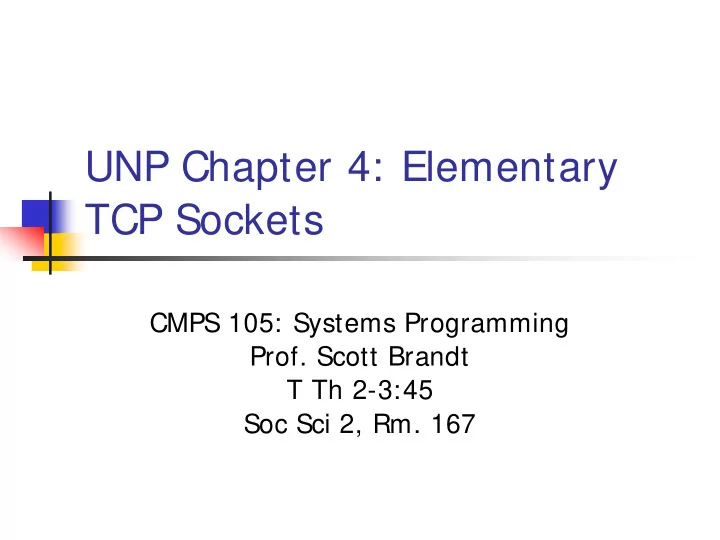

UNP Chapter 4: Elementary TCP Sockets CMPS 105: Systems Programming Prof. Scott Brandt T Th 2-3:45 Soc Sci 2, Rm. 167
Introduction � First: Elementary socket functions � Next: TCP client-server example � Concurrent services � Common Unix server technique � Allows server to simultaneously serve multiple clients � Server forks a separate process to serve each client
Typical TCP Client-Server Scenario � Figure 4.1 (p. 96) � Server starts up � Client starts up and connects to server � Client contacts server � Server processes client request � Server responds to client � Client closes connection � Server goes back to waiting for clients to connect
socket() � To perform network I/O, a process first calls socket() � Called by both client and server � # include < sys/socket.h> � int socket(int family , int type , int protocol ); � returns a socket descriptor
socket() parameters � family specifies the protocol family or domain � AF_INET: IPv4 protocols � AF_INET6: IPv6 protocols � AF_LOCAL: Unix domain protocols � AF_ROUTE: Routing sockets � AF_KEY: Key socket � Usually: AF_INET � AF_LOCAL might work on CATS machines
socket() parameters � type specifies type of communication � SOCK_STREAM: stream socket � SOCK_DGRAM: datagram socket � SOCK_SEQPACKET: sequenced packet socket � SOCK_RAW: raw socket � TCP supports only SOCK_STREAM � UDP supports SOCK_DGRAM
socket() parameters � protocol specifies transport protocol � IPPROTO_TCP: TCP transport protocol � IPPROTO_UDP: UDP transport protocol � IPPROTO_SCTP: SCTP transport protocol � TCP provides reliable, in-order streaming communication � Resends lost packets, guarantees order � UDP provides possibly unreliable, possibly out-of-order message delivery � Doesn’t guarantee anything, but usually works fine
connect() � Use by a TCP client to establish a connection with a TCP server � # include < sys/socket.h> � int connect(int sockfd , const struct sockaddr * servaddr , socklen_t addrlen ); � Returns when the connection has been established � Possible errors: timeout, host not found, connection refused
connect() parameters � sockfd is the socket descriptor returned by socket() � servaddr is the socket address � Contains the IP address and port number of the server � addrlen is the size of the address structure
bind() � Used by server to bind a socket to an IP address/port pair � # include < sys/socket.h> � int bind(int sockfd , const struct sockaddr * myaddr , socklen_t addrlen ); � Common error: EADDRINUSE
bind() parameters � sockfd is the socket descriptor returned by socket() � myaddr is the address of this server � Note: addresses are protocol-specific � Usually well-known addresses so that clients can find the server � addrlen is the length of the address
listen() � Called by a TCP server to: � Set the socket up to receive connections � Specify the maximum number of connections the kernel should queue up for this socket � # include < sys/socket.h> � int listen(int sockfd , int backlog ); � Normally called after socket() and bind() and before accept() � sockfd is the socket descriptor from socket() � backlog should be non-zero
accept() � Called by a TCP server to return the next completed connection from a client � Blocks if no connection is available � # include < sys/socket.h> � int accept(int sockfd , struct sockaddr * cliaddr , socklen_t * addrlen ); � sockfd is the socket descriptor from socket() � cliaddr is the address of the client that connected to the server � Returns a new socket descriptor for the connection to the client
int main(int argc, char **argv) { int listenfd, connfd; struct sockaddr_in servaddr; char buff[maxline]; time_t ticks; listenfd = socket(AF_INET, SOCK_STREAM, 0); bzero(&servaddr, sizeof(servaddr); servaddr.sin_family = AF_INET; servaddr.sin_addr.s_addr = htonl(INADDR_ANY); servaddr.sin_port = htons(13); // daytime sever bind(listenfd, (SA *) &servaddr, sizeof(servaddr)); listen(listenfd, LISTENQ); while(1) { connfd = accept(listenfd, (SA *)NULL, NULL); ticks = time(NULL); snprintf(buff, sizeof(buff), “%.24s\r\n”, ctime(&ticks)); write(connfd, buff, strlen(buff)); close(connfd); } }
Concurrent Servers � The previous example is an iterative server � It sequentially receives connections and processes each request in turn � A concurrent server forks a child process to handle each request � Multiple requests can be handled in parallel by multiple concurrently executing child processes
pid_t pid; int listenfd, connfd; listenfd = socket(…); bind(listenfd, …); listen(listenfd, LISTENQ); while(1) { connfd = accept(listenfd, …); if( (pid = fork()) == 0) { close(listenfd); doit(connfd); // service the request close(connfd); exit(0); } close(connfd); }
close() � Normal close() is used to close sockets � # include < unistd.h> � int close(int sockfd );
getsockname() and getpeername() � getsockname() returns the local protocol address associate with a socket � Used to get socket address when responding to a wildcard connection � getpeername() returns the foreign protocol address associated with a socket � Used to get client address in an execed process
Recommend
More recommend